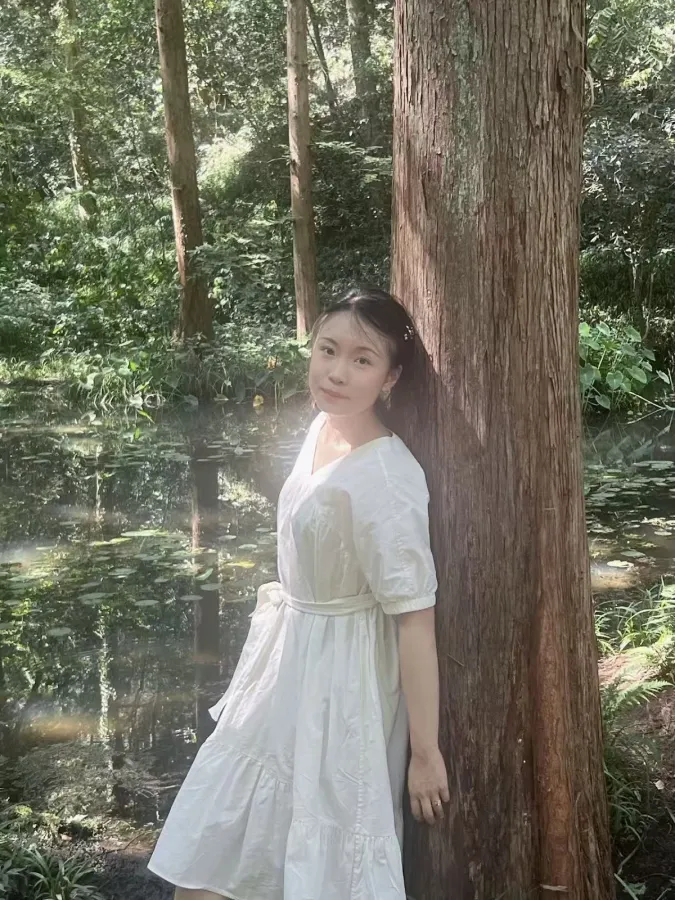Annie Che Lu '26

Annie Che Lu ‘26 didn’t always identify as a musician. Before coming to Swarthmore, her interests were primarily related to writing; she immersed herself in her school’s IB Literature offerings, treating music as a pastime. “I was a singer in district chorus, but I just kept that [singing] as a hobby.”
After arriving at the College as a prospective comparative literature student, Che Lu cast a wide net, exploring the numerous course offerings in everything from German to Japanese literature. Realizing that she preferred the language-learning element of the discipline, Che Lu pivoted to a major in linguistics. “I was looking for something universal,” says Che Lu, in reference to her choice to switch majors. “I wanted to learn about languages. Music itself is both a language and universal.”
Linguistics gave Che Lu a new etymological lens through which to view the study of music, and she found herself seeking out more opportunities to pursue it at Swarthmore. Music theory, private voice instruction through Music 048, and ensembles eventually led to a Music Minor, but what Che Lu valued most about the Department was the connections she fostered among her professors and peers.
“I really enjoyed the communication mode of one-on-one [learning] and forming intimate bonds with specific people. I think it made me feel less homesick. I also loved the Taiko ensemble. With them, I made very special connections. It was a close community, and I think we bonded over how demanding an experience it was.”
In her time playing for the Chinese Music Ensemble, Che Lu remembers an overwhelming inclusiveness and the excitement of learning new instruments. “Learning Chinese flute was really nice. It was an instrument I didn’t know how to play, but the Chinese Music Ensemble enabled me to have so many interesting experiences,” says Che Lu.
Playing in a Fetter Chamber Ensemble with her friend Yiyang Salome Jin '25 proved equally transformative, offering the same musical intensity within a more intimate setting. Through these ensembles, she performed numerous works from the Classical canon while also discovering a genre that seamlessly bridged her passions for literature, writing, language, and music: the art song. “The art song connects music and poetry, highlighting that music is, in fact, a language. Musicality enables language to transcend its expressive limits — the differences between languages themselves … I started to sing more art songs and even wrote my own.”
Inspired by the lyrical poetics of the art song, Che Lu is interested in pursuing a graduate degree in vocal performance, specializing in German and Chinese forms of art song: “I want to do art song because I want to focus more on my own writing and singing. Then, I can go on to be a professor and teach classical singing in China. I hope that there, I can equip musicians with a more multifaceted understanding of how to perform and think about music.”
Swarthmore’s Music Department has ingrained in Che Lu a motivation and desire to collaborate. In her senior recital, accompanied on piano, she will be singing three Italian Arias, as well as a suite of French, German, and Chinese pieces. The recital will take place on March 28th, 2026, at 8 pm in Lang Concert Hall.
--
Favorite music course at Swarthmore: MUSI 013: Harmony, Counterpoint, and Form 3.
Favorite music-making experience at Swarthmore: Performing a Mozart duet in Fetter (Figaro’s Wedding and Idomeneo.)
What you’ll miss most about Swarthmore: Lang Concert Hall.
What sound or noise do you love? Schubert’s “Ständchen.”
What sound or noise do you hate? Squeaky chalk on the blackboard.
What’s the last song/piece you played on your phone? “Pipa Xing,” a Chinese pop song based on the poem of the same title.



